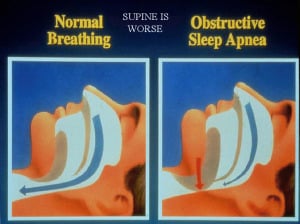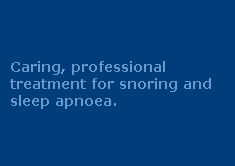Obstructive Sleep Apnoea
Obstructive Sleep Apnoea is a serious medical condition.
Obstructive sleep apnoea (or sleep apnea, depending on which part of the world you come from) is derived from the Greek: a- without; and pnoea- breathing. As the name suggests, obstructive sleep apnoea or 'OSA' describes a condition where the patient ceases to breathe while asleep as a result of an obstruction to their airway.
The obstruction is normally because the soft tissues of the upper airway, such as the tongue, soft palate, uvula and/or the pharyngeal walls have relaxed or collapsed and blocked the flow of air. 
The consequences of obstructive sleep apnoea are varied but consistently serious. Common side effects and co-morbidities of obstructive sleep apnoea include hypertension, ischemic heart disease, type 2 diabetes, GERD (gastro eosophageal reflux disease, or acid reflux), impotence, metabolic retardation and obesity. Treatment of obstructive sleep apnoea often helps in the treatment of these conditions and is frequently a pre-requisite to their successful treatment.
Obstructive sleep apnoea also has numerous negative effects on the general wellbeing of the sufferer.
Common consequences of obstructive sleep apnoea include waking tiredness, excessive daytime sleepiness, anxiety, depression, mood swings, loss of cognitive function (or ability to think clearly) and relationship problems, including separate room sleeping arrangements.
Obstructive sleep apnoea is one of two forms of apnoea. The other form of apnoea is central apnoea. This is a rarer form of apnoea, but no less dangerous. People suffering from central apnoea do not have the normal breathing reflex of a healthy human and so do not draw breath as and when they should. This is a neurological rather than physical condition and requires extensive treatment.
Some patients suffer from a condition known as 'mixed apnoea' or 'complex apnoea', which describes a sleeping pattern where both obstructive sleep apnoea and central apnoea occurs.
In all cases, the side effects and consequences of obstructive sleep apnoea are very serious and tend to worsen over time. For more information, visit Effects of Snoring & Apnoea.
If you suspect you or someone you know has any obstructive sleep apnoea, call 1300 246 637 to discuss the options with a friendly treatment coordinator, or complete the form below.

